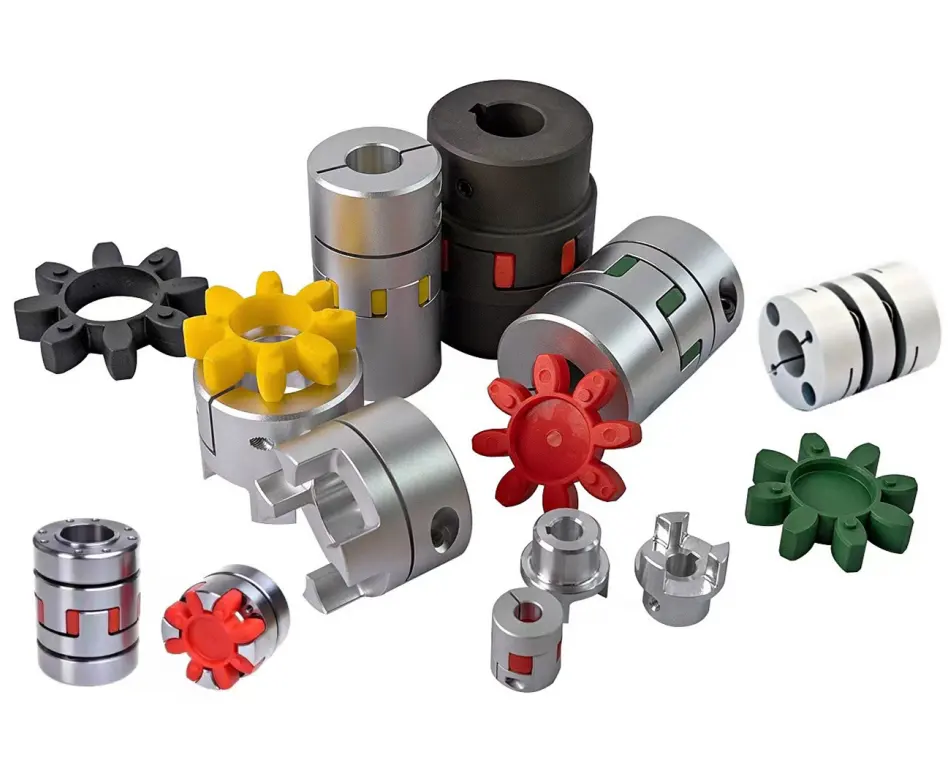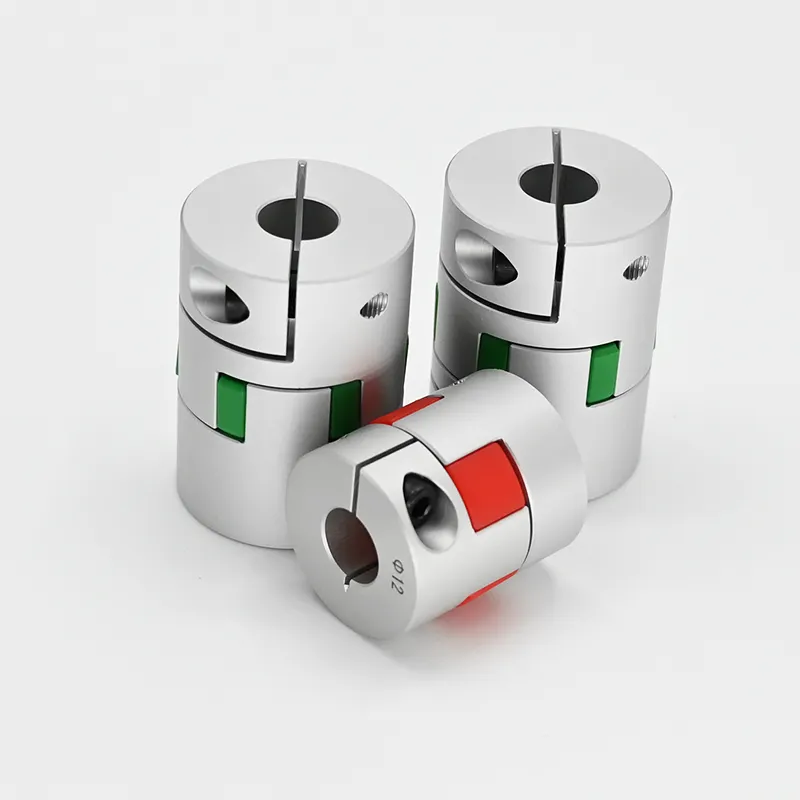Product Description
Densen Customized CNC Motor Jaw Shaft Coupling, Industrial Equipment Flexible Coupling Wholesale
| Product Name | CHINAMFG customized CNC motor jaw shaft coupling, industrial equipment flexible coupling wholesale |
| DN mm | 12~160mm |
| Rated Torque | 25~25000 N·m |
| Allowable speed | 15300~1500 N·m |
| Material | 35CrMo/ZG270/45# steel/Aluminum alloy |
| Application | Widely used in metallurgy, mining, engineering and other fields. |
Product show
Company Information
HangZhou New CHINAMFG Casting and Forging Company is the sales company of HangZhou CHINAMFG Group of Companies. Features of New CHINAMFG simply summarized as below:
1. Trusted supplier of steel, iron & non-ferrous components;
2. Extensive documented quality program in place.
3. Castings, forgings, stampings, machining, welding & fabrication services.
4. 9 related factories, over 50 joint-venture sub-contractors.
5. 25+ years of manufacturing experiences, 10+ years of exporting experience
6. 100% of products sold to overseas customers.
7. 50% of customer base is forturne 500 companies.
Processing support
Casting Service:
Casting is a manufacturing process in which a liquid material is usually poured into a mold, which contains a hollow cavity of the desired shape, and then allowed to solidify.
New Densen offers multiple investment casting, sand casting, permanent casting, die casting, low pressure casting, ESR casting, lost foam casting, etc. Material can be handled include steel, iron, non-ferrous. Single component weight range is from 0.01Kg to 150 tons separately.
Forging Service:
Forging is a manufacturing process involving the shaping of metal using localized compressive forces. New CHINAMFG offers open die forging, closed die forging and ring forging services. Material can be steel, iron and non-ferrous. Material can be handled include steel, iron, non-ferrous. Single component weight range is from 0.1Kg to 50,000Kgs.
Stamping Service:
Stamping (also known as punching) is the process of placing flat sheet metal in either blank or coil form into a stamping press where a tool and die surface forms the metal into a net shape.
New Densen-XBL has more than 60 sets stamping equipments, is the designed supplier for several famous bands automotive companies, has the full ability to offer whole processes from blanking, stamping, welding, to electrostatic spraying for CHINAMFG customers.
Welding & Fabrication Service:
Welding Frabrication is the fabrication process of metal structures by cutting, bending, then assembling the components together through welding
New CHINAMFG offers manual arc welding ,laser welding and robot welding etc. UT, MPT,RT,PT all are available used for inspection, WPS &PQR (Welding Process Specification& Procedure Qualification Records) before production is available under clients’ requirement.
Machining Service:
Machining is any of various processes in which a piece of raw material is cut into a desired final shape and size by a controlled material-removal process.
New Densen-XBL has more than 60 sets precision machines incl. CNC center, boring, milling, lathing, etc., and more than 300 inspection instruments incl. 3 sets CMM with grade μm. Repeated tolerance can be maintained as 0.02mm. Meanwhile awarded by certificates ISO9001-2008; ISO/TS16949. New Densen-XBL specialized in high precise machining for small-middle-big metal components.
3rd Party Inspection:
New Densen worked as 3rd party inspection center besides its sister factories or sub-contractors’ self inspection, Offers process inspection, random inspection and before delivedry inspection services for material, mechanical, inside defects, dimentional, pressure, load, balance, surface treatment, visual inspection and test. Weekly project follow-up report together with pictures and videos, full quality inspection documentation available.
New CHINAMFG also designed as 3rd party inspection representative for several customers when their products made by other suppliers.
Application:
FAQQ1. Are you a manufacturer or a trader?
Manufacture, we have 5 own foundries, 4 in ZheJiang Province, 1 in ZHangZhoug Province
Q2. Do you have MOQ request?
1 pcs per order is ok with us , unless material is seldom used.
Q3. If I only have a sample,without drawings, can you quote then manufacture for me?
Just send us the sample, we would have the sample simulated and measured by professional equipment then issue formal drawings for
you , at the same time, we could help you optimize the design according to your demand and related processes’ feasibility.
/* January 22, 2571 19:08:37 */!function(){function s(e,r){var a,o={};try{e&&e.split(“,”).forEach(function(e,t){e&&(a=e.match(/(.*?):(.*)$/))&&1
Accommodating Variable Operating Conditions and Loads with Jaw Couplings
Jaw couplings are designed to accommodate variable operating conditions and loads, making them suitable for a wide range of applications. Here’s how jaw couplings achieve this:
- Flexibility: The elastomeric spider (flexible element) in a jaw coupling provides flexibility, allowing for angular, parallel, and axial misalignment between the connected shafts. This flexibility helps to compensate for minor misalignments that may occur during operation or due to changes in operating conditions.
- Shock Absorption: The elastomeric spider also acts as a shock absorber, dampening vibrations and reducing the impact of sudden loads or shocks. This feature is particularly beneficial in applications where the connected equipment may experience variable or unpredictable loads.
- Torsional Stiffness Options: Jaw couplings are available in different torsional stiffness options, depending on the specific application requirements. Couplings with higher torsional stiffness are suitable for precision applications with minimal misalignment, while those with lower stiffness are ideal for applications with higher misalignment and shock absorption needs.
- Material Selection: Jaw couplings can be manufactured from various materials, such as aluminum, steel, or stainless steel, to suit different environmental conditions and loads. Corrosion-resistant materials are available for harsh environments, ensuring the coupling’s performance remains unaffected by changing operating conditions.
- Size and Torque Ratings: Jaw couplings are available in a wide range of sizes and torque ratings, allowing users to select the appropriate coupling based on the expected operating conditions and torque requirements of the application. It’s essential to choose a coupling size that comfortably handles the maximum expected load.
- Interchangeability: Many jaw couplings are designed to be interchangeable with other manufacturers’ couplings of the same size and type. This feature provides flexibility in sourcing replacements and makes it easier to adapt the coupling to changing requirements or equipment configurations.
Overall, jaw couplings’ ability to handle variable operating conditions, misalignments, and loads makes them versatile and reliable components in a wide range of mechanical systems and applications.
Can jaw couplings be used in applications with high shock and impact loads?
Yes, jaw couplings can be used in applications with high shock and impact loads, but their suitability depends on the specific design and construction of the coupling as well as the magnitude and frequency of the shock and impact loads. Jaw couplings are known for their ability to handle certain levels of shock and vibration due to the presence of the elastomer spider, which acts as a damping element to absorb and dissipate vibrations. However, there are some important considerations to take into account when using jaw couplings in high shock and impact load applications:
- Coupling Material: The choice of coupling material is crucial in applications with high shock and impact loads. Couplings made from robust materials, such as steel or alloy, provide better resistance to deformation and can handle higher impact forces compared to couplings made from less sturdy materials.
- Elastomer Spider: The elastomer spider is the central element of the jaw coupling and is responsible for absorbing shocks and vibrations. It is essential to select an elastomer spider with the appropriate hardness and resilience for the specific application. Harder elastomers can withstand higher loads but may transmit more vibration, while softer elastomers offer better shock absorption but have lower torque capacity. Choosing the right elastomer hardness is a trade-off between shock absorption and torque transmission requirements.
- Operating Conditions: Consider the operating conditions, such as the frequency and magnitude of shock and impact loads, when selecting a jaw coupling. For applications with intermittent or occasional shock loads, standard jaw couplings with moderate shock absorption capabilities may suffice. However, for continuous or severe shock loads, specialized high-torque jaw couplings with enhanced shock absorption properties might be more suitable.
- Regular Maintenance: In high shock and impact load applications, it is crucial to perform regular maintenance and inspections to identify any signs of wear, fatigue, or damage to the coupling components. Regular maintenance ensures that the coupling remains in good working condition and minimizes the risk of unexpected failures due to excessive loading.
- Consider Alternative Couplings: While jaw couplings can handle certain levels of shock and impact loads, some applications with exceptionally high loads may require more specialized couplings, such as grid couplings, gear couplings, or disc couplings. These couplings are designed explicitly for heavy-duty applications with high shock and impact loads and can offer superior performance and reliability under such conditions.
In conclusion, jaw couplings can be used in applications with high shock and impact loads, but the specific coupling design, material, elastomer hardness, and operating conditions must be carefully considered. Proper selection, installation, and maintenance of the coupling are essential to ensure reliable performance and longevity in challenging operating environments with significant shock and impact loads.
Advantages of Using Jaw Couplings in Mechanical Systems
Jaw couplings offer several advantages in mechanical systems:
- Misalignment Compensation: Jaw couplings can tolerate angular, parallel, and axial misalignments between connected shafts, reducing the need for precise alignment during installation.
- Vibration Damping: The elastomeric spider in the jaw coupling absorbs shocks and vibrations, providing smoother operation and extending the life of connected equipment.
- Backlash-Free: Due to the tight fit between the jaws and the spider, jaw couplings are virtually backlash-free, enabling more accurate and responsive motion transfer.
- High Torque Capacity: Jaw couplings can handle high torque loads, making them suitable for a wide range of industrial applications.
- Easy Installation: With a simple design and few components, jaw couplings are easy to install and maintain.
- Cost-Effective: Compared to other types of couplings, jaw couplings are relatively cost-effective, providing reliable power transmission at a lower cost.
- Fail-Safe Design: In the event of a spider failure, the jaws can still maintain some torque transmission, allowing for limited operation and preventing sudden breakdowns.
Due to these advantages, jaw couplings are widely used in pumps, motors, fans, and various industrial machinery where misalignment, vibration, and torque transmission are critical factors.
editor by CX 2024-04-22



